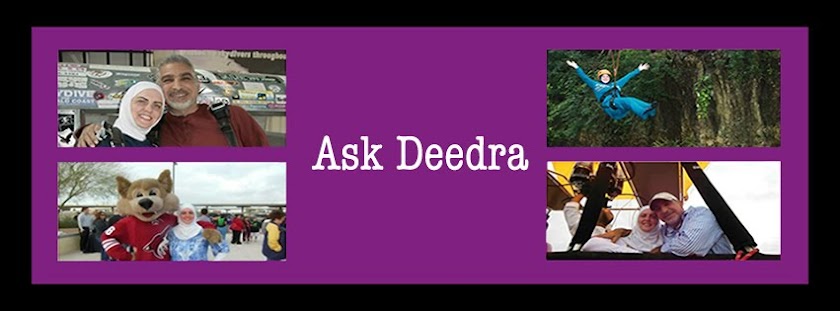I was reading an article by an aspiring journalist who
decided to wear the headscarf (hijab) for a month and record her experiences.
In her resulting article, ‘Undercover in hijab’: unveiling one month later, she
mentions that none of her classmates or co-workers asked any questions and made
no comments about her suddenly having a scarf on. When she asked some of them
later “why,” “several said it was too ‘touchy’ or insensitive to bring up.”
But I do not completely forget and am often surprised when
others seem to avoid mentioning it even when relevant. Like it might be offensive or something. It
is just a piece of cloth that I have chosen to wear. Though it has meaning for
me, for everyone else I would think it is similar to any other accessory I
might wear.
Once while I was in law school, a professor mentioned the
school wanted to have an event with local non-profits presenting their
volunteer opportunities, but they were having difficulty contacting local
organizations. I told them I knew a lot of the local organizations because I
had worked with them over the years as a community advocate. I offered to
provide the professor with my contacts. As a result, the event was scheduled
and the majority of the presenters were organizations I had suggested.
Catholic Social Services was one of them. I had a good
friend that worked there so I went up to the presenter and asked about my
friend. She said she knew her. I asked her to tell my friend I said "hi." She
responded, “Yes. I will tell her the girl with blond hair said hi.” I
responded, “Or you could tell her the girl wearing the scarf said hi. Better
yet, I could give you my name.”
I had to laugh. The blond? Really? You cannot even see my
hair. What blond? My eyebrows are not
even blond. Further, how is being blond even distinguishable? Can you imagine
how many “blonds” a person might know?
She was very nice but obviously did not know what to do with
me. She acted like saying “the girl wearing the scarf” might be offensive in
the same way “the girl with the big mole on her nose” would be offensive.
It isn’t.
It isn’t.
In a similar story, someone told me they would tell my
friend the girl with blue eyes said "hi." Again, how is that even
distinguishable? How could mentioning someone’s eye color, unless their eye
color were extremely unusual, jog anyone’s memory?
I am not sure how the scarf became so taboo. This is not
from the Muslims who wear the scarf. To us, there is nothing taboo or embarrassing about it.
Generally the taboo reactions seem to fall into just a few
categories.
One, people are trying a little too hard not to be
offensive.
Two, people are not sure if acknowledging the scarf might
lead to deeper conversations that might make them uncomfortable.
Three, people have assumptions of what the scarf means,
usually negative.
On the one hand, one of the intentions of the scarf is to
remove my sexuality from our interactions – I would prefer whether you like my
hair or legs not to be part of the equation, such as whether I get a job or
whether you like the job that I am doing.
On the other hand, trying so hard to ignore it makes it a
very large elephant in the room - completely unnecessarily.
Regardless of my reasons for wearing the scarf, for everyone
else it really should be no more than an accessory. Some people wear a
crucifix, some a yarmulke, some just jewelry or scarfs (even on the head) as fashion statements. Do
we go to such extremes to avoid those topics?
Some people wear wigs too. [Okay, that might be different. If a person is wearing a wig or
hairpiece, maybe they don’t want to know if you know. Yes, probably better to avoid that
conversation.]
Muslim are not the only ones who wear some form of
headscarves: several Christian sects outside the United States, including most
Nuns, but not just Catholics; Amish, Quakers, Hutterites, Mennonites, and Anabaptists
are all Christians sects in the United States whose women cover their hair; several
Jewish traditions, both inside and outside the United States, wear hair
covering (some in the form of a wig); some Hindus and Sikhs also cover their hair. For all of them, modesty
is the objective even if the exact style or amount of hair coverage might be different. [Here is the coolest test to see if you can pick out religion
based on head covering. I got 7/10 right, so even I can get confused.]
When a woman is wearing a headscarf, we do not have to talk
about religion, or even why she is wearing it, but you do not need to go out of your way to pretend
you never noticed it either.
Have you ever felt uncomfortable mentioning a head covering
to someone? Can you tell me what held you back?
Do you have a funny story about someone bending over
backwards to avoid acknowledging your head scarf?


Mike is christian; he had a relation with muslim girl whom I knew from middleast. Then, he said "do you know the black girl wearing full hijab in the college?". I said offcourse; she is from Sudan. He replied" I respect her because she lives up to her principals as muslim !!!". I was astonished & happy to hear that.
ReplyDelete